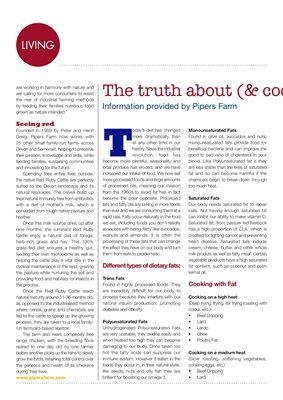
LIVINGLIVING
natural immunity free from antibiotics with
a diet of mother's milk, which is converted
from rough native pasture and heather.
Once this milk source dries up after nine
months, the ruminant Red Ruby Cattle
enjoy a natural diet of forage, herb-rich
grass and hay. This 100% grass-fed diet
ensures a healthy gut, feeding their own
microbiome as well as helping the cattle
play a vital role in the cyclical maintenance
of the land, grazing the pasture while
nurturing the soil and providing food and
habitats for insects in the process.
Once the Red Ruby Cattle reach
natural maturity around 31-36 months old,
as opposed to the industrialised method
where cereal, grains and chemicals are
fed to the cattle to speed up the growing
process, they are taken to a local familyrun farmyard-based
abattoir.
The farm also rears completely free
range chicken, with the breeding flock
reared to one day old by one farmer
before another picks up the reins to slowly
grow the birds, retaining total control over
the genetics and health of its chickens
during their lives.
www.pipersfarm.com
The truth
about fat
T
oday's diet has changed
more dramatically than
at any other time in our
history. Since the industrial
revolution, food has
become more plentiful, seasonality and
local produce has eroded, and we have
increased our intake of food. We now eat
more processed foods and large amounts
of processed oils, meaning our mission
from the 1960s to avoid fat has in fact
become the polar opposite. Processed
fats and fatty oils are lurking in more foods
than ever and we are consuming them at
a rapid rate.
Fats occur naturally in the food we
eat, including foods you don't readily
associate with being 'fatty' like avocados,
walnuts and almonds. It is often the
processing of these fats that can change
the effect they have on our body and turn
them from safe to problematic.
Different types of dietary fats:
Trans Fats
Found in highly processed foods. They
are incredibly difficult for our body to
process because they interfere with our
natural insulin production, promoting
diabetes and obesity.
Polyunsaturated Fats
Unhydrogenated Polyunsaturated Fats
are very unstable, they oxidise easily and
when heated too high they can become
damaging to our body. Once taken too
hot the fatty acids can suppress our
immune system. However if eaten in the
foods they occur in, in their natural state,
like seeds, nuts and oily fish they are
brilliant for boosting our omega 3.
Monounsaturated Fats
Found in olive oil, avocados and nuts,